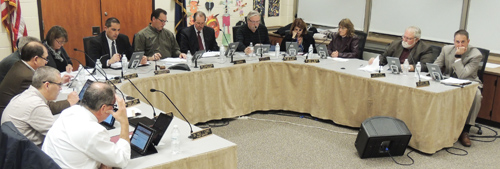
Armstrong School District directors received an eight-page memo from Solicitor Lee Price last night about other tax-payer tax-saving options they have in addition to the residential and commercial LERTA agreements some local municipalities are recommending.
by Jonathan Weaver
A trio of local municipalities is awaiting final approval from County Commissioners and Armstrong School District board directors to give 10-year tax abatements to its residents.
But, school directors might have other ideas.
Before the conclusion of last night’s school board meeting, Superintendent Chris DeVivo made school board directors aware of an eight-page memo of abatement options given to them by Solicitor Lee Price.
Board President Joseph Close said board directors asked Price to present the options during Thursday’s open caucus session discussion on the topic. He was anxious to look at Price’s memo.
“There (are) a lot of different scenarios that you can put together,” Close said. “We want to look into it and perhaps do something district-wide, not township-by-township because right now, some (townships) have (tax abatement programs) and some don’t. We want to put some uniformity to it, one plan that looks at all residential options slightly different but still offers that incentive.”
School directors had a two-year abatement option for approximately 10 years before elected officials did not renew the option again this past summer.
School directors also have the ability to call in existing Local Economic Revitalization Tax Assistance (LERTA) agreements when they vote on a new structure.
Close said school board members will try to collaborate with County officials before a final decision.
School directors also unanimously approved to use some of the proceeds from the furniture and equipment auctions at the now-closed Ford City, Kittanning and Kittanning Township schools.
As explained by Business Affairs Director Sam Kirk, school directors will dedicate some of the more than $200,000 earned during the auctions toward new Student Informational System and Financial System software.
“We’re using some of those funds to offset the cost of the software,” Kirk said. “It will benefit all the stakeholders – parents, students (and) staff.”
The student informational software will help students schedule and will also allow parents to access up-to-date grades and attendance records, for example.
Kirk said officials hope to have the software installed and available to parents and administrators by the beginning of the 2016-17 school year.


